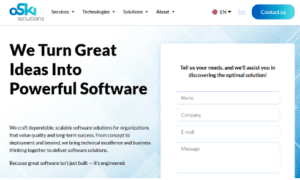So you’ve decided to start a web app project but don’t have in-house talents to bring your idea to life. Outsourcing custom software development seems the best way out, considering a great variety of vendors out there. However, don’t hurry to sign on the dotted line.
Take your time getting known your potential partner. Scrutinizing customer reviews is the first thing to do, but it’s not enough. To choose the optimal company, be ready to ask a number of crucial questions.
What Is Your Background?
That is one of the must-ask questions — make sure your vendor has considerable experience in developing industry-specific solutions.
In other words, the contractor has to understand the specifics of your business. Let’s say you want to build an e-store. That being the case, your service supplier should be able to deliver a secure ecommerce solution with a robust backend allowing a great number of users to shop simultaneously.
Or, if you’re a healthcare provider, the company you plan to hire should know how to develop HIPAA-compliant and highly interoperable software. One more thing a good vendor will pay attention to is UX design — the future solution should be easy to use for non-techie physicians and patients.
To see for yourself if the prospective vendor has enough expertise in the domain you’re interested in, ask for customer testimonials, case studies, as well as capability development statements.
How Will I Monetize My App?
Unless you’re a non-profit organization, you’ll want to get your money’s worth. An expert contractor who knows the ins and outs of your business will advise about the optimal revenue channels.
If your goal is to carve a niche in video, your service provider has to be experienced in building online video platforms (OVPs) that support various types of content: video on demand (VoD), live streaming, and live-to-VOD. In such a way, you’ll be able to leverage a number of monetization options, including ad insertion, paid subscription, and pay-per-view.
These immediate revenue approaches also come well with textual content and can be widely implemented in a range of business domains: media and entertainment, sports, e-Learning, etc.
Depending on your business goals, you might want to adopt other revenue-generating models, such as re-seller or revenue share. Ask your vendor if they can deliver that.
What Will the Communication Process Look Like?
Once you’ve decided to outsource, effective communication becomes the question of primary importance.
Distance is not a barrier if you’re actively using various communication channels, such as emails, phone calls, video conferencing, and instant messaging. Besides, don’t forget about onsite visits — another stepping stone to project success.
If constant communication and transparency are your top priority, ask the software provider about scrum. That is a software development model that presupposes close interaction between the client and the team to formalize requirements for a certain sprint (a short timeboxed development cycle), discuss progress in the current one, and analyze the work done.
Depending on the agreed process, you might need such collaboration tools as Trello, Jira, or Asana.
How Will I Avoid Bugs?
A crucial question to ask, it’ll help you to make sure your app will run like clockwork. And it stands to reason that the software company you are planning to hire should have a team of experienced testers.
Here are some types of testing you can’t dispense with:
1) Functional testing — performed according to a requirements specification — is aimed to ensure that your web app works as it’s supposed to. For instance, by timely testing the user workflows of your ecommerce website (registration, checkout, payment, etc.) for appropriate behavior, you’ll be able to deliver a seamless shopping experience.
2) UI & UX testing will show whether your app matches the original mockups and designs. This type of testing is indispensable for ensuring proper spelling and grammar, style consistency, and content readability. Your vendor should also perform cross-device and cross-browser testing to prove your solution is optimized for all resolutions, screen orientations, and network conditions.
3) Security testing is set to detect the possible vulnerabilities of your app. To guarantee sensitive data protection, your contractor will have to apply best security testing techniques, such as vulnerability and security scanning, penetration testing, risk assessment, security auditing, and ethical hacking.
4) Integration testing will check how your web app interacts with third-party software. For example, your online shop will certainly need integration with payment gateways and point of sale terminals; and your patient portal — with mHealth apps and EHR systems. Ask your vendor about how they’ll tackle this task.
What about Intellectual Property?
One more thing to discuss is intellectual property (IP). IP covers copyright, trademarks, patents, know-how, as well as an array of forms like source code, databases, logo, etc.
It’s obvious you’ll want to own the product you pay for. Make certain the would-be solution is created under ‘work made for hire’ copyright. That means you get exclusive rights for the source code and design, and can reuse these components for future projects.
Besides, make sure your contractor has a strong source code protection policy. That usually means deploying data loss prevention (DLP) tools for real-time flow monitoring and network audit to prevent both inside and outside attackers from stealing the code.
What Is GDPR?
The General Data Protection Regulation (GDPR) has been this spring’s most discussed topic, and talks about data privacy continue until now with no signs of abating. And for a good reason.
No matter the niche you’re in, your solution will likely gather a client’s personal information: fist and last name, home address, email, identification card number, IP address, etc. This information relates to an identified or identifiable living individual and is subject to the protection requirements set by the GDPR.
Although the regulation extends to the companies doing business in the European Union, it’s doesn’t mean your US-based firm has nothing to worry about. Any company that has a web presence and offers their products or services over the web — meaning collects data of EU citizens — has to meet the GDPR requirements.
To build GDPR-compliant software, your vendor should be able to help you find answers to the following questions: “How much data can be collected?”, “For how long can data be kept and is it necessary to update it?”, “What information must be given to individuals whose data is collected?”, “Can data received from a third party be used for marketing?”, “What is a data breach and what do we have to do in case of a data breach?”, and some others.
Easier Said Than Done
Choosing the optimal software provider is never easy — this process requires a thoughtful analysis of the prospective candidates. To avoid losing time, effort, and money, see for yourself that the potential contractor understands your business needs and knows how to monetize your solution. Also, pay particular attention to testing, software copyright, data protection, as well as the way communication and hiring are handled.
About the Author:
Yana Yelina is a Tech Writer at Oxagile, a New York-based custom software development company based in the USA. Her articles have been featured on ITProPortal, Business2Community, SmallBizDaily, and Datafloq, to name a few. Yana is passionate about the untapped potential of technology and explores the perks it can bring businesses of every stripe. You can reach Yana at yana.yelina@oxagile.com or connect via LinkedIn or Twitter.































